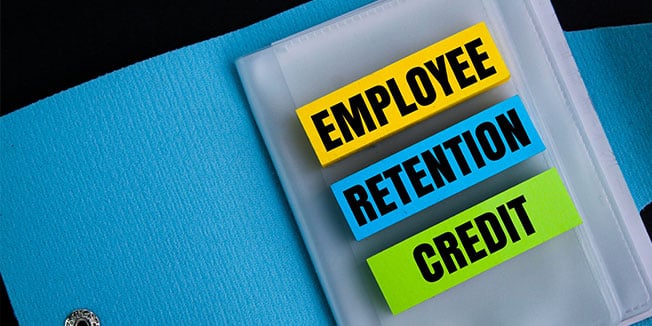
Freed Maxick Healthcare Consulting and Tax Team

Newly proposed federal legislation will require ERC Promoters to disclose their clients to the IRS. This move increases audit scrutiny for all businesses, particularly those who sought promoter assistance for ERC refunds. Employers are advised to proactively verify their claims with an independent third party, ensuring compliance and preparing for potential audits.
Congress created the Employee Retention Credit (ERC) program in early 2020 as a way to encourage employers to keep employees on their payrolls during the COVID-19 pandemic. The credit covered specific periods in 2020 and 2021, but employers could file claims into 2024.
However, the program soon faced challenges with improper claims, prompting the IRS to halt new claim processing in September 2023. In response, the IRS introduced a Voluntary Disclosure Program (VDP) at the year's end, offering a chance for businesses that may have filed "questionable" ERC claims, often through promoters, to settle their debts and not be charged interest and penalties if repaid the full 80%.
In January 2024 Congress proposed legislation that would, among other things, institute penalties for noncompliance with due diligence requirements, accelerate the deadline to file ERC claims from April 15, 2025 to January 31, 2024, create a broad definition of ERC “Promoters”; and requires ERC Promoters (as defined) to disclose information to the IRS with respect to designated types of transactions (known as “listed transactions”) and to make lists of advice recipients with respect to such transactions available to the IRS upon request.
Essentially, the IRS will provide a road map to many ERC recipients who worked with ERC Promoters, and the association of the ERC recipient to the ERC Promoter is very likely to draw additional IRS audit scrutiny.
Understanding Employee Retention Credits and the Role of Promoters
The ERC program provided a refundable credit to employers who continued paying employees during government-ordered shutdowns or periods of reduced revenue related to the COVID-19 pandemic. Eligibility hinged on specific pandemic-related disruptions, and the amount of the credit ranged from 50% to 70% of qualified wages paid to eligible employees.
Many organizations hired an ERC Promoter to help with ERC eligibility determination and refund claims. The proposed tax legislation defines a "promoter" as an individual or entity that provides aid, assistance, or advice regarding any affidavit, refund, claim, or other document related to an ERC claim. This definition of a promoter includes those who charge a “success fee” contingent on the size of the credit obtained and/or if the promoter itself meets a "gross receipts test.” Whereby the aggregate gross receipts from providing ERC-related services is equal to or more of the promoter’s total gross receipts for the relevant year, and/or if 20% of the promoter's gross receipts related to ERC advice exceeds 20% and total gross receipts from ERC related advice exceeds $500,000.
Why the Crackdown on ERC Claims?
The IRS shifted its focus to combatting fraudulent claims spurred by aggressive marketing tactics from some promoters. These entities often misled employers about their eligibility, resulting in a spike in invalid claims.
To partially address this, in September 2023 the IRS announced that it would temporarily stop processing new ERC claims, citing concerns about “questionable claims” and scams. It had reportedly received several hundred thousand claims over the summer of 2023 alone. In October 2023, it unveiled a special program that allows employers to withdraw ERC claims that are either in progress or already processed. For employers that take advantage of this program, there are several benefits.
What does the Voluntary Disclosure Program (VDP) offer?
The VDP is designed for employers who, upon reflection, suspect their ERC claim might not withstand IRS scrutiny. To qualify, employers must not have received a demand for repayment or be under criminal investigation for their ERC claim. Accepted employers can repay 80% of the received credit without interest or penalties and without it affecting their taxable income, provided they meet the program's requirements.
Acceptance into the VDP program does not grant an employer immunity from prosecution. Completing the program requirements makes prosecution less likely, though, as the IRS focuses its efforts on taxpayers who are avoiding paying what they owe.
The IRS began accepting VDP Program applications in December 2023. It will continue to accept them through March 22, 2024.
How to Navigate the Increased ERC Tax Credit Audit Risk
Recent legislative proposals aim to require ERC promoters to disclose their client lists to the IRS, likely guiding the agency in targeting entities for ERC audits. Given the aggressive tactics of some promoters - including success-fee arrangements - the IRS is expected to examine these cases closely.
Employers who obtained ERC refunds, especially those who engaged Promoters in a contingent/success fee arrangement, should consider reassessing their position, perhaps with the assistance of an independent third party. This reassessment should challenge initial assumptions, scrutinize supporting documentation, and ensure the claim's legitimacy. Given the IRS's commitment to identifying and recouping fraudulent claims, even organizations with legitimate claims should prepare for a thorough audit process. The statute of limitations extends generally five years from the date of the claim. The recently proposed legislation would extend that to six years. Thus, the quality of documentation retained to support the claim is critical to surviving future audit scrutiny.
Freed Maxick is here to offer guidance and support for those navigating this complex process. To reach out to our team directly or for a comprehensive understanding of the Employee Retention Credit, click here to download our detailed guide. You can also connect with our team directly by completing our contact form here.
The IRS has intensified its scrutiny of Employee Retention Credit (ERC) claims with the introduction of Letter 6612, marking the beginning of audits. Businesses making ERC claims must swiftly provide detailed documentation to validate their eligibility, including gross receipts reconciliation and proof of government-mandated closures. The issuance of Letter 6612 puts ERC claim refunds on hold until audit results are obtained, emphasizing the need for businesses to promptly substantiate their eligibility.
For more information please visit: https://www.irs.gov/individuals/understanding-your-letter-6612
The IRS recommends businesses consult with tax professionals to review Letter 6612 and ensure accurate ERC calculations. Freed Maxick offers assistance in validating ERC claims and addressing IRS requests outlined in Letter 6612.